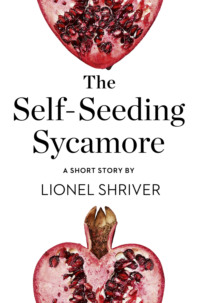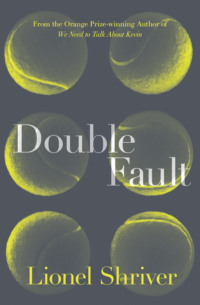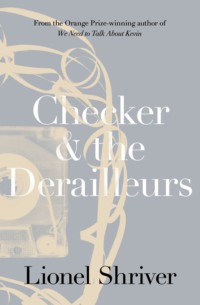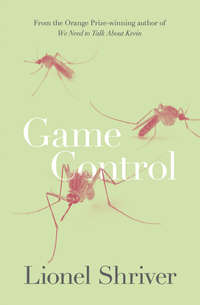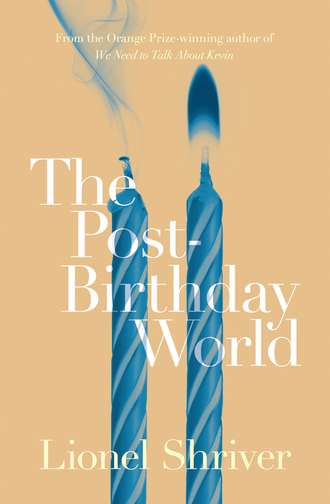
Полная версия
The Post-Birthday World
“Oh,” she scrambled, “running a few errands.”
Wrong. People who have lived together for years were never “running errands.” She could have said she was at Tesco because they were low on Greek yogurt, or at the hardware store at Elephant & Castle because the lightbulb in the studio desk light had burnt out—that’s what you say to the man you live with. Because Irina knew all about the exactingly particular nature of domestic reportage, her failure to heed its form was tantamount to wearing a sandwich board that announced in big block letters, BEHOLD MY CHEATING HEART. Then again, she may have envied many a talent—her sister’s for ballet, Lawrence’s for politics. But a knack for duplicity? She didn’t want to get good at this.
“I thought you were all hot to trot to get some work done today.”
“I don’t know. It just wasn’t flowing. You know how that is?”
“Since you’re suddenly so secretive about your drawings, no I don’t know.” She followed him limply to the kitchen, where he fixed himself a peanut-butter cracker. His motions were jagged. Those five unanswered messages had stuck in his craw.
“Anything up today at Blue Sky?”
“It’s mooted the IRA ceasefire will be reinstated soon.” His tone was clipped. “But nothing that would interest you … What are you wearing that getup for?”
She crossed her arms over her exposed midriff, a style that seemed suddenly too young. “Felt like it. It’s started to bother me that I wear rubbish all the time.”
“Americans,” he snarled, “say trash.”
“I’m half Russian.”
“Don’t pull rank. You have an American accent, an American passport, and a father from Ohio. Besides, a Russian would say khlam, or moosr. Not rubbish, da?” When no longer trying to please, Lawrence’s Russian improved dramatically.
“What’s—” Yet another British expression, What’s got up your nose? would only rile him further. “What’s bothering you?”
“You took my head off this morning because you were so anxious to get to work. I called around ten, it was busy, and by ten-thirty you were already gadding about. As far as I can tell, you’ve been out all day. Have you gotten anything done? I doubt it.”
“I’m a little blocked.”
“You’ve never indulged in that arty-farty—rubbish. A real pro sits down and does the job, whether or not she feels like it. Or that’s what you used to say.”
“Well. People change.”
“Apparently.” Lawrence scrutinized her face. “Are you wearing lipstick?”
Irina almost never wore makeup, and wet her lips. “No, of course not. It’s been, you know, a little warm. Just chapped is all.”
When Lawrence left to turn on the Channel 4 news, Irina slipped into the loo to check her face. Her lips were a bruised cherry-red; her chin was rug-burn pink. Ramsey had needed a shave. Maybe she’d been lucky. Lawrence hadn’t remarked on her chin, or detected white wine on her breath. They’d polished off two bottles of sauvignon blanc, while Ramsey had insisted on playing her a flecked video of some famous 1985 snooker match on his flat-screen TV in the basement—which could not compete with the sport on his couch. Though she’d only managed a bite of the smoked salmon and beluga, the fish might still linger, and she’d cadged more than one of Ramsey’s Gauloises. Not taking any chances, Irina brushed her teeth. It wasn’t her custom to brush her teeth at seven, but she could always claim to have burped a little stomach acid or something. Discouragingly, even when you didn’t want to get good at this sort of thing, you got good at it anyway.
It wasn’t like Lawrence not to sniff out the wine. He had a nose like a hound. That meant he may have noticed her chin, too, and the hint of smoked fish. In the living room, his concentration on Jon Snow was excessive.
“I’ll have the popcorn in a minute!” she said brightly from the doorway. “And for dinner, how about pasta?” She’d forgotten to take the chicken out to thaw.
“Whatever.” One more report on mad cow disease could not have been that compelling. The British government had been slaughtering those poor animals by the tens of thousands for months.
“I could make the kind with dried chilies and anchovies that you especially like!”
“Yeah, sure.” He looked over and smiled, gratefully. “That would be great. Make it hot. Make it a killer.”
Pasta was far more than she need have offered. He was already accepting crumbs.


The bedclothes were seductive, but, with Lawrence up, the swaddling lost its appeal. The dream eluding capture had been unsettling—something about the Beatles in her bedroom, mocking her undersized breasts. Lawrence would sometimes let her sleep in, but whenever Irina arose and found him away to work she felt dolorous and cheated. So she crawled out of bed. Even if they didn’t chat much in the morning, percolating side by side without having to talk was its own pleasure, and it was nice to begin the day as a team.
After trotting off to buy a Telegraph, she yawned back to the kitchen in painter’s pants and a soft, floppy button-down, entering into the clock-work of their morning routine. Some people found the infinite iterations of home life tedious. For Irina, its rhythms were musical; the shriek of the grinder was the day’s opening fanfare. She welcomed a refrain to which she could almost hum along: the gurgle and choke of the stove-top espresso pot, the roar and strangle of the steamer wand as she whipped the milk to froth. If duplicating the same proportions every morning lent her coffee preparation an inevitable monotony, she wouldn’t opt for too little milk just because making her coffee badly was different. There was nothing tiresome about having established that, because Lawrence liked his toast on the dark side, the ideal setting on the toaster was halfway between 3 and 4. The properties of repetition, she considered, were complex. Up to a point, repetition was a magnifier, and elevated habit to ritual. Taken too far, it could grow erosive, and grind ritual to the mindless and rote. In kind, the pound of surf, depending on the tides, could either deposit sand on the shore, or wear it away.
While Irina was not averse to variety—sometimes the coffee was from Ethiopia, others from Uruguay—overall, variety was overrated. She preferred variation within sameness. If you were voracious for constant change, you ran out of breakfast beverages in short order. She had some appreciation for folks with a greed for sensation, who were determined, as an old boyfriend used to say, “to squeeze the orange” and press fresh experience from every day. But that way lay burnout. There were only so many experiences, really—a depressing discovery in itself—and surely you were better off trying to replicate the pleasing ones as often as possible.
Furthermore, she reflected, steaming the milk with her signature teaspoon of Horlicks (which rounded the edge off the acid), that impression of “infinite” repetition—of having coffee and toast over and over and over, numbingly into the horizon—is an illusion. Boredom with routine is a luxury, and one unfailingly brief. You are awarded a discrete number of mornings, and are well advised to savour every single awakening that isn’t marred by arthritis or Alzheimer’s. You will drink only so many cups of coffee. You will read only so many newspapers, and not one edition more. You glory in silent communion with your soul mate at the dining table a specific, quantifiable number of times—so inclined, you could count them—before, wham, from one calamity or another at least one of you isn’t there anymore. (Not so long ago, Irina had feared a falling-out, one that would shake her faith in “the whole project,” but that anxiety had been latterly eclipsed by the more powerful fear that Lawrence would die. Thus a growing sense of security in one realm begot an accelerating sense of menace in another, one in which “the whole project” was jeopardized in a more absolute regard.) Whenever Irina read those listings in news articles, of how many meals the average person totals over a lifetime, how many years he spends sleeping, how many individual instances he will go to the loo, she was never dazzled by all those digits, but humbled by their paltriness and finitude. According to the actuarial average, this was one of only seventy-eight summers that she was likely to sample, and forty-two were dispatched. It was shocking.
“Been out all last week,” said Lawrence through his toast. “Work’s really piling up. I’m going to have to get a move on.”
“Don’t bolt your food!” she chided. “And if you drink your coffee too fast, you’ll burn your throat. Why not take it easy, read a few pages of The End of Welfare?”
“I concentrate better at the office.”
“Wouldn’t you like another piece of toast? It’s that gorgeous loaf from Borough Market, and it doesn’t last. Eat it while it’s fresh.”
“Nah,” said Lawrence, wiping the crumbs from his mouth. “Gotta go.”
“Did you see this mad cow article?” Irina was shamelessly trying to keep him home a few minutes longer, as she’d once wrapped around her father’s ankle when he had another six-week shoot to coach movie dialogue in California and was trying to get out the door. “Now that the price of mince is down to 49p a pound, beef sales are starting to soar. Have you read about what CJD is like? But never mind risking a long, slow death as your brain turns to sponge if you can save a quid or two on dinner. It doesn’t make any sense! At £1.39, nobody will touch the stuff because it might kill you, but at 49p no problem?”
“Pretty good deal! How about hamburgers tonight?”
“Not on your life. We’re having chicken.”
Irina saw him to the door, and managed to stall his departure with more small-talk until she bid Lawrence a reluctant do svidanya.
She tidied up and took the chicken out to thaw, fighting a customary desolation. Even Lawrence’s standard weekday abandonment fostered a little grief.
Once settled in her studio, she had trouble focusing on the next illustration of Seeing Red. The impulse to make a phone call was insistent. Merely a courtesy call, of course. It was plain good form, was it not, when someone has treated you to a sumptuous spread, to thank him for his generosity? She could make it short.
The number in her address book was still under Jude’s name. Her hand rested on the receiver for several seconds, her heart pounding. A courtesy call. She picked up the phone. She put it back in its cradle. She picked it up again.
“Hallo?”
She put the receiver right back down. He’d sounded sleepy. It was too early. And she’d thanked him already, Saturday night, at the door. How silly, to have roused him for nothing. How much sillier, that she was shaking. At least he’d have no way of knowing who rang, only to rudely hang up. He’d assume it was one of those computer-generated phone solicitations, or a wrong number.
Yet as Irina returned to her drawing table, it came to her with a nauseous lurch that he would know. He would know with absolute certainty who had rung, heard his voice, been stricken by an opaque terror, and thrown the receiver to its cradle as if it might bite. In many respects they were near strangers, so it was disconcerting to realize that he knew her that well.
The illustration went no better than before. Whatever had lit her up while she was sketching the arrival of the Crimson Traveller was with-drawing from reach. Yesterday’s inspired effort was the best of the set so far. But no matter how many times she tried, she was unable to recapture the style that Lawrence had described as unusually “bonkers.” If she couldn’t get the same frantic, energized quality into the companion illustrations, she would have to throw the “bonkers” one away. It didn’t match. It stood out. The first introduction of the colour red had seemed alarming, outrageous, electrifying. In each of today’s abortive efforts, red seemed ordinary. Blending side by side with the blues, it made purple all right, but purple seemed ordinary, too. Though now expanded by a factor of two, the palette still felt cramped, and she pined for a Yellow Traveller to release her into the spectrum. She made a note of the idea for the author, that for children to come to a fuller understanding of the nature of colour, a Yellow Traveller toward the end would make sense. Maybe she could imply slyly that the addition would be popular with the Chinese.
Lawrence rang early afternoon. He often called for no reason, and the more spurious his excuse, the more she was charmed. “Hey, I tried you around ten, and it was busy. Talk to anyone interesting?”
“Oh, you must have tried me at perfectly the wrong point. I picked up the phone to ring Betsy, and then thought better of distracting myself, and put it back.”
What a strange little fib. She might easily have been honest: she’d rung Ramsey to thank him for dinner, had obviously woken him, and, abashed, had simply hung up with what Lawrence would regard as her usual social maladroitness. Yet just now she resisted raising the topic of Ramsey in conversation. Ramsey had become—private. Whatever had passed between them on his birthday belonged to her, and she cherished owning something of which Lawrence was not a part.
“So how’s it going?”
“Lousy. I keep tearing everything up.”
“Give yourself a break! The one you did yesterday was tremendous. Maybe you should take the afternoon off for once. Go for a walk, go to the library. Head up to that place on Roman Road where you found all those cheap Indian spices. While you’re at it, you could go smoke dope with Ramsey and giggle over his video of the Steve Davis–Dennis Taylor match of 1985.”
She should have kept her mouth shut about that joint. “Very funny.”
“Well, I’m not kidding about the match. You should watch a replay someday. It’s the most famous in snooker. Did I ever tell you that story?”
Oh, probably, but if so, Irina hadn’t been listening. How did so many couples grow deaf to each other? Since he would clearly enjoy recounting the famous showdown—again—she encouraged him.
“It was the World Championship at the Crucible. Dennis Taylor—this geeky-looking guy from Northern Ireland, with big dopey-looking horn-rims, right? Well, he’d been on the circuit for thirteen years before he won a single tournament. So Taylor was considered a laughable long-shot against Steve Davis. Who was, you know, God’s gift to snooker by ’85. Reigning champion, and regarded as unbeatable. The final was bound to be a whitewash.
“That’s the way it started, too: Taylor went down seven–zip in the first session. But he rallied in the second, almost evening the score at nine–seven, and in the third session he also finished just two frames down, at thirteen–eleven. Still, all the commentators are saying, isn’t it great that the poor schmuck won’t go down without a fight. Like it’s cute or something.
“But in the final session, Taylor pulls even, at seventeen apiece. First to eighteen, right? So eventually the championship goes down not only to the last frame, but to the last ball. The black, of course. There’s this unbelievable sequence where Taylor misses a double, then Davis fucks up, too, then Taylor takes on a long pot and barely misses, thinks all’s lost and mopes back to his chair as if his pet just died. But it’s a thin cut, and Davis botches his opportunity, too, leaving a pretty easy black. When Taylor potted it for the title, the Crucible went bananas.”
“So it’s a David and Goliath story. Little engine that could.”
“Yeah. And the broadcast of that last session set BBC records. Watched by eighteen million people. Biggest audience any British sportscast had ever garnered. Ramsey says those were the days. Snooker players were like rock stars in the 80s. They lived the life of Riley, and got away with murder, too. Lotta bad boys. Ramsey says the new crop of players is too boring, and that’s why the audience has shrunk.”
Ramsey says. Though he had generously lent the man out for one evening, Lawrence wanted Ramsey back. Like Dennis Taylor, she was disinclined to relinquish a valuable trophy without a fight. “On the contrary. Ramsey says that the new crop of players has gotten too good, and that’s why the audience has shrunk.”
“Same idea,” said Lawrence. “Ramsey says that too good is too boring.”
They both understood they meant good at snooker rather than good as in virtuous. Still, once they finished the call, the line stayed with her.

The concept behind the holiday of Thanksgiving in the States is all very laudable. Nevertheless, it doesn’t work. It is nigh impossible to sincerely count your blessings on the last Thursday of November because you’re supposed to. The occasion is reliably squandered on fretting that the turkey breast is drying out while those last morsels on the inner thighs are still running red.
Yet thankfulness can descend unscheduled. When Lawrence cried “Irina Galina!” at the door that evening, and Irina rejoined from her studio, “Lawrence Lawrensovich!” she was grateful. When he told her about his day over peanut-butter crackers—his contacts had passed on a rumour that the IRA ceasefire would soon be reinstated—she may never have quite understood the fracas in Ulster, nor have kept up with whether its paramilitaries were or were not bombing the bejesus out of Britain these days, nor have comprehended why they would do such a thing in the first place, but still she was grateful—that Lawrence had work that fascinated him, whether or not it fascinated her. That he cared enough to fill her in about what he did during the day and respected her opinion. That were she to ask him, he would patiently explain the ins and outs of Northern Ireland in whatever detail she wished. That he would not take offence if just tonight she gave the exegesis a miss. When they settled in front of the Channel 4 news, she was grateful that she wasn’t a dairy farmer, watching his herd go up in smoke. While she was confessedly growing fatigued with the mad-cow-disease story, by and large British newscasts were superior to their American counterparts—more serious, more in-depth—and she was grateful for that, too.
Preparing their traditional predinner popcorn, Irina was thankful for another routine of perfectly balanced variation within sameness. She had worked out the exact oil-to-kernel ratio that would maximize loft and minimize grease; after experimentation across a range of popcorn brands, she always bought Dunn’s River, the least likely to prove dried out. One shelf of her spice rack was devoted to so many ethnic toppings—Cajun, Creole, Fajita mix—that she could serve a differently seasoned bowlful every day of the month. Tonight she chose black pepper, parmesan, and garlic powder, a favorite combination, and as they decimated the batch she was glad of a snack that you could gorge on that would not fill you up.
Picking up the remnants of cheese at the bottom of the bowl with a moistened forefinger, Irina considered that they were both in perfect health, and sometimes physical well-being could convert from the blank space between ailments to witting pleasure. Entering middle age, they remained a handsome couple; she’d survived a rash bout of chocolate-cappuccino cake, and she still wasn’t fat. No one close to her had recently died. Lawrence, grumbling over when this protracted segment on BSE would ever be over, was conspicuously alive. Dinner—the chicken had been marinating in a deadly Indonesian jerk sauce all afternoon—would be smashing.
Nothing was wrong. Most of all, the air between them was clear. She may have kept quiet about a couple of purely interior moments with Ramsey Acton over the weekend, but she had granted herself permission this afternoon to hold those slight cards close to her chest. If Saturday night’s disquieting temptation had sent a tremor through this flat, the earth had stilled again. It was surely not naïve to believe that neither she nor Lawrence was hiding any great secret from the other. Lawrence was not covertly gambling away their savings at OTB—if he said he went to the gym on his lunch hour, to the gym he went—nor was he going through the motions of heading to the office every day when in truth he’d been sacked months ago. Maybe she did sneak an occasional cigarette, but Irina was not popping amphetamines while Lawrence was at Blue Sky. She hadn’t developed a furtive morning sherry habit, or a stealthy dependence on Valium. Lawrence did not harbour a whole other family in Rome, whom he visited while pretending to attend a conference in Sarajevo. So while it was possible that a pizza delivery boy would press the wrong buzzer, there was no chance that their doorbell would be rung tonight by a sullen teenager whom Lawrence hadn’t admitted to siring years ago, who now wanted money. Irina wasn’t brooding through the news over how to break it to Lawrence that her self-absorbed mother could no longer afford the upkeep of her house in Brighton Beach and would be moving into their spare bedroom next week. Lawrence wasn’t brooding through the news over how to break it to Irina that after all these years he had come to the realization that he was gay. And on Saturday night, Irina hadn’t kissed another man while Lawrence was away.
Some years thanksgiving arrives in the lowercase, in July.


On one more exasperating afternoon in August, Irina thumbed through the illustrations for Seeing Red up until the blazing arrival of the Crimson Traveller, gripped the pages by the corners, and ripped them from her drawing pad. Not allowing herself to reconsider, she immediately tore them in half, and crumpled the uninspired blue pictures into the bin. Only the new ones had life. Only the new illustrations were tolerable to her: those visited by a tall, terrifying figure from another world, whose rash, outlandish hues would blow the mind of any stunted visual pauper raised in the cramped, confining spectrum of midnight to cerulean. How had she ever borne drafting those first nine workaday pictures without red? Nevertheless, she would craft the blue ones again. The redrawn blues would pulse with need, with longing and deprivation, with all of the dolour and ache that gave “the blues” its emotional and musical connotations.
Though she told herself that she was simply being professional, the impatient disposal was still unnerving. What else formerly of such value, on which she had lavished painstaking care, might she suddenly tear asunder and cart to the bin because it was “workaday” and “uninspired”?
Meanwhile, just as Irina grew more expert at designing excuses for why she was out when Lawrence rang, Lawrence ceased to solicit them. By the end of the month, when once again she barely beat him back to the flat, no “Please hang up and try agains” would await her on the answering machine. If she wasn’t there, he didn’t want to know, so perhaps he didn’t want to know why, either.
She found his company unendurable.
Always a bit excessive, their dependence on television grew extravagant. Night after night they propped stuporously in their appointed seats, both glad of such a miraculous object—one that facilitated spending hours at a go in the same room without speaking, and at once cast this catatonic antisocial behaviour as perfectly normal. Nervous of coming upon such a black hole in the schedule that they might be forced to turn off the set—say, a deadly confluence of World’s Wildest Police Videos, Gardener’s World, and House Doctor—Lawrence took to returning daily from work with a video.




